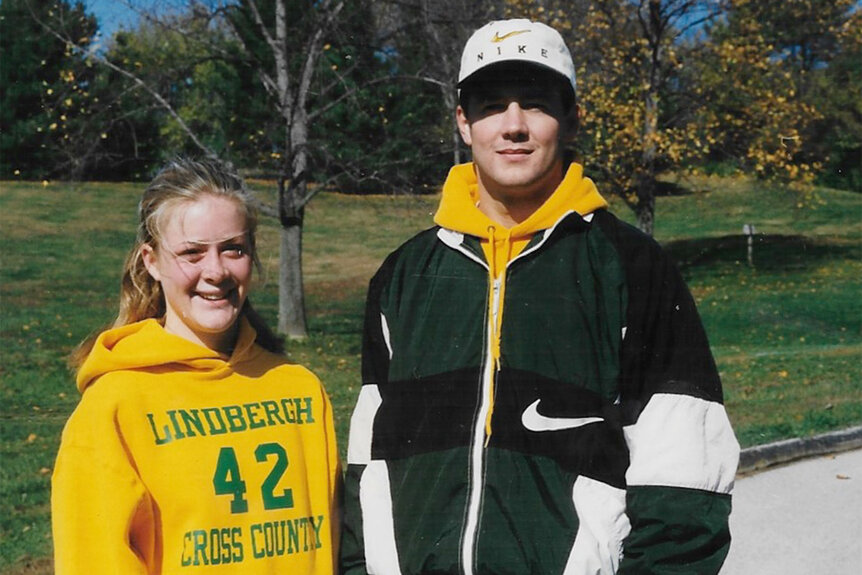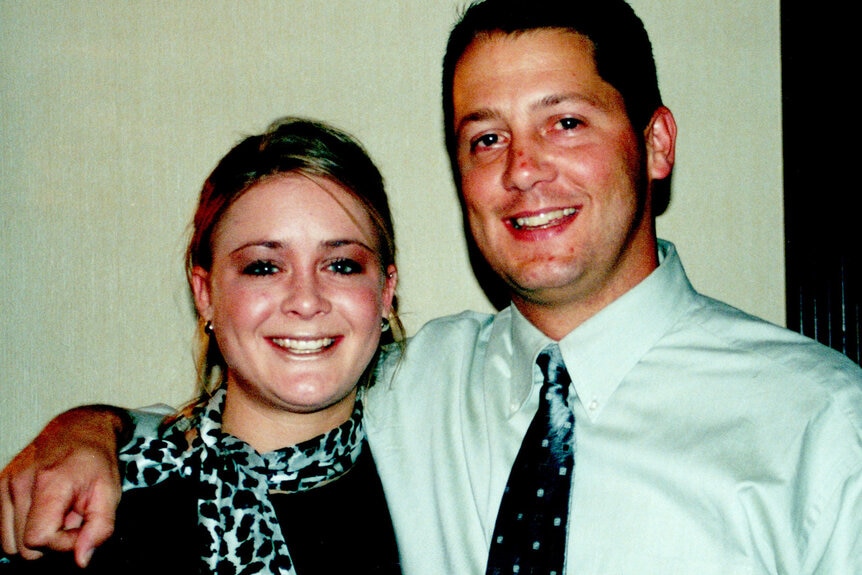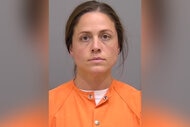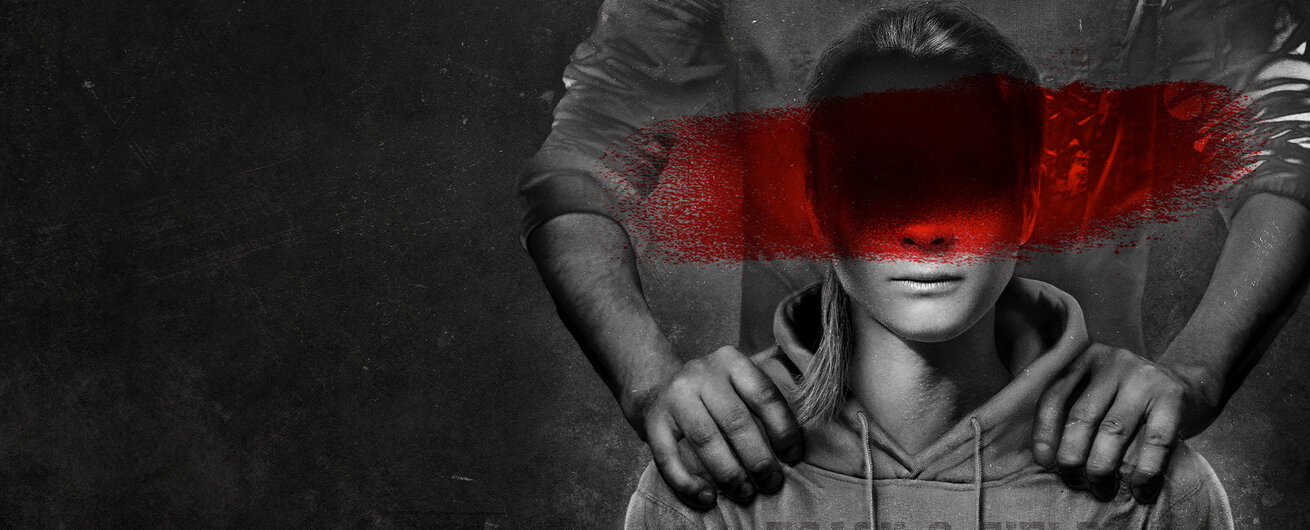Create a free profile to get unlimited access to exclusive videos, breaking news, sweepstakes, and more!
What Are Mandated Reporting Laws — And Did A Missouri High School Violate Them In A Sexual Assault Case?
Popular track coach Jim Wilder was accused of sexual assault by multiple students. Did the high school respond accordingly?
Whenever an individual identified as a “mandated reporter” in the state of Missouri has reasonable cause to suspect that a child has been abused or neglected, they are required to immediately report the suspicions to the proper authorities.
But does this always happen?
Oxygen’s special “The Case Died With Her” explores new questions about whether the Lindbergh School District followed the mandated reporting requirements after learning of two different cases of alleged sexual abuse between students at the school and popular cross-country coach Jim Wilder.
Emilie Morris was called into the principal’s office to discuss her rumored inappropriate relationship with Wilder in 1996, along with her parents.
At the time, Emilie Morris and Jim Wilder both denied any inappropriate relationship — and the principal conducted a “complete investigation” before concluding that Wilder was a “positive influence” on his student athletes, BuzzFeed News reported in 2018.
Wilder continued to coach the cross-country team at the high school and teach at a nearby middle school.
But then, 12 years later, in 2008, another female student told school administrators that she and Wilder had sexually inappropriate contact with one another. The allegations surfaced after the teen’s concerned grandparents had reached out to her teachers to find out if any of the educators had observed any changes to her behavior.
The district didn’t report the allegations to police until a week after the teen’s grandparents sent the note to teachers.
Former prosecutor Loni Coombs — who re-examines Emilie’s story in “The Case Died With Her” — determined that after reviewing a 2008 police report outlining the allegations and talking with the Morris family, the high school “may have violated mandating reporting laws in both situations.”
What Are Mandated Reporting Laws?
The Federal Child Abuse Prevention and Treatment Act requires that every state has provisions or procedures in place that require certain individuals, referred to as mandated reporters, to report known or suspected instances of child abuse or neglect, according to the Child Welfare Information Gateway.
Although each state differs in its individual provisions, as of 2019, 47 states designate certain professions to be mandated reporters who are required by law to report suspected abuse.
In the state of Missouri, where Lindbergh High School is located, the state statute includes a long list of mandated reporters including physicians, dentists, hospital personnel, daycare providers, teachers, principals and other school officials, law enforcement officers, and ministers, according to January 2020 guidelines from the Missouri Department of Social Services Children’s Division.
School districts and the governing body of charter schools within the state are also required by law to include teacher and employee training on “identifying signs of sexual abuse in children and danger signals of potentially abusive relationships between children and adults,” the guidelines state.
When child abuse or neglect is suspected, the state requires mandated reporters to “immediately report” the instance either to a Child Abuse/Neglect Hotline maintained by the Children’s Division or online through the department’s website.
“No internal investigation shall be initiated until such a report has been made,” the current guidelines state.
A Dangerous Secret
In Emilie’s case, she would eventually tell St. Louis County police that she and Wilder began an inappropriate relationship when she was just 16 years old.
Emilie said Wilder, who was married and 29 years old at the time, allegedly played a sexually-charged game of chicken with her in a park near the school as other members of the cross-country team played capture the flag nearby, according to the special. During the game, Emilie told authorities that Wilder put his hand on her thigh and continued to raise it until he reached her genitals and then held his hand there over her pants until another runner came by, according to the special.
The pair then began regularly engaging in oral sex in Emilie’s home, a park bathroom, and the wrestling office at the high school, she claimed.
Emilie and Wilder allegedly tried to keep the relationship under the radar, but it eventually sparked rumors in the high school.
“Everybody knew about it. It was just one of those things that you didn’t talk about,” Emilie’s friend and fellow student, Christine Lieber, said in “The Case Died With Her.”
The rumors eventually made their way to the school’s principal in March 1996, who contacted Emilie’s parents.
“We received a message on our answering machine from Mr. [David] Skillman, who was the principal of Lindbergh High School at the time, indicating that Emilie had been accused of having an affair with a teacher,” Emilie’s mom, Joan Morris, recalled in the special. “I was outraged.”
Emilie and Wilder both denied the relationship, but Emilie’s parents still met with the high school principal to discuss the allegations.
“We went to the high school. Skillman said this was a one-time accusation, possibly out of jealousy because Wilder was a top coach and Emilie was a top runner. It was handled very casually — ‘We’ve looked into this and there’s no problem,’” Joan recalled of the meeting. “I think to make our lives easier maybe we believed it and I wish we hadn’t.”
Lindbergh Schools told BuzzFeed News in 2018 it had no record of whether information regarding the allegations was ever reported to social services, as required by state law.
Joan herself said that if the incident was ever reported, she was unaware of it.
“The Case Died With Her” reached out to Skillman for comment, but he declined.
Emilie would go to police when she was an adult in 2013 with her allegations against Wilder. She then secretly recorded an 87-minute long conversation between herself and Wilder about the alleged relationship. He was arrested and charged with six counts of sodomy, but the case was later dropped after Emilie was found dead in her apartment 16 months later.
Another Arrest
Wilder found himself having to defend his actions once again more than a decade after that 1996 meeting with the principal, after another student came forward with claims of sexual abuse.
This time, a 15-year-old female and a friend sought advice from a science teacher at the school about what to do if someone was involved in an inappropriate relationship, according to “The Case Died With Her.”
The science teacher was concerned and reached out to the school’s guidance counselor, who eventually passed the concerns onto the school’s administrators.
The school principal at the time spoke with the teen on Nov. 4, 2008. The girl alleged she had a sexually inappropriate relationship with Wilder that began when she was ineighth grade. She claimed Wilder would massage her knee after school and they began to talk about intimate details of his life, including his marriage and his penis size, according to the special.
In one instance, the teenager alleged Wilder had picked her up from her boyfriend’s house and brought her back to the high school wrestling room where he started to massage her and encouraged her to relax, according to a police report obtained by Jessica Testa, who wrote the 2018 BuzzFeed article about Emilie Morris’ case.
“He stated, ‘If you have an orgasm, your body will relax,’ and then he starts laughing and says, ‘Oh my god, I can’t believe I am doing this,’” Testa read from the report in “The Case Died With Her.”
After the teen claimed her muscles were “too sore” Wilder allegedly suggested they switch and directed her to touch him, brushing her hand against his penis, according to the special.
The teen also provided specifics about Wilder’s groin and a unique knot or bump he had gotten near his groin from an accident.
Officials reported the possible sexual abuse to police, but not before doing their own investigation into the claims.
“At the time that the school reported this to the police, they said they’d done their own internal investigation of this report and found the allegations to be baseless,” Coombs said in the special. “Teachers, including Wilder, called the young girl troubled and a difficult child. She was accused of making up lies.”
When police asked if they had made a report to Missouri Department of Social Services Children’s Division, the school district said they “had not made the phone call because they had been advised by their legal counsel to not do so,” Coombs said.
Police said in the 2008 report of the incident that the school’s failure to immediately report the suspected abuse “may have jeopardized any criminal investigation.”
Wilder was arrested for sodomy in late 2008, but just a few months later, Prosecuting Attorney Robert McCulloch declined to prosecute the case citing a “lack of any credible evidence that any sexual contact had taken place,” South County Times reported in 2009.
Wilder was allowed to return to the classroom.
“Based on the 2008 police report and statements made by the Morris family about how the school handled Emilie’s case, Lindbergh High School may have violated mandated reporting laws in both situations,” Coombs said.
Why Do Institutions Fail To Report?
Joelle Casteix, a child sexual abuse advocate, said in “The Case Died With Her” that institutions may decide not to report suspected abuse, despite the laws in place, to try to protect their reputation.
“Institutions protect institutions over kids because of liability,” she said. “They don’t want to be sued. They don’t want other victims to come forward. They want to make the problem go away.”
Casteix said it’s often “easier” to try to cover up the abuse rather than make the mandated report.
“Children are a short-term problem in high school because they are only there four years,” she said. “If you get the kid out, if you can discredit the kid, then you are fine.”
Joy Oesterly, with the organization Missouri Kids First, appeared to agree with the assessment, saying in the special that “when institutions conduct their internal investigations they are usually doing it for liability purposes” and are not “focused on the health and safety of the child.”
Anthony Vaterott, who had been Emilie’s high school friend and is now an educator himself, said it’s not uncommon for a school district to try to sweep away possible allegations of abuse.
“This happens all the time where you have students that approach the school with a claim of a teacher having an inappropriate relationship with them and when you have a program that’s known for being so good, there’s a lot of pressure on administration to make those problems go away,” he said.
Although Wilder never had to face the allegations against him in a courtroom and continued to teach in the district for decades, his contract with the district was eventually terminated in 2015, according to The St. Louis Post-Dispatch.
Wilder was allowed to resign from his post nearly two years after being put on administrative leave after being arrested in Emilie’s case.
“Our responsibility is to keep students safe at all times. As soon as Lindbergh Schools received new evidence in 2015 from St. Louis County Police regarding Mr. Wilder’s conduct, the Board of Education and administration took immediate action to terminate his contract,” the district later said in a statement to Testa, according to the special. “The agreement, signed in 2015, ensures that Mr. Wilder never step foot on a Lindbergh campus again.”
For more on this story, watch “The Case Died With Her,” streaming now on Oxygen.com.



































